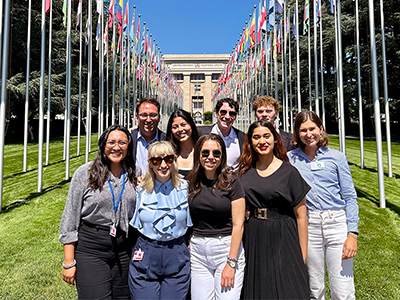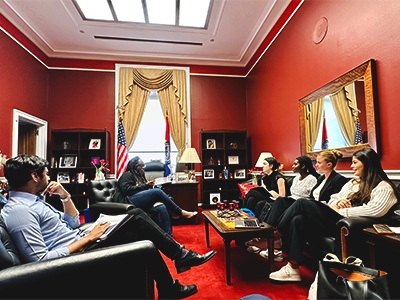SPIA Undergraduates Undergo a Immersive Policy Advocacy Clinic in DC, Trenton and Geneva

When the School of Public and International Affairs launched the Princeton Policy Advocacy Clinic last fall, nobody knew what to expect. The program, which was designed to teach undergraduates how to find policy solutions for social problems and then engage them in advocacy campaigns to advance those policies, was the first of its kind in higher education.
If its inaugural year is any indication, SPIA has a smash hit on its hands.
Eleven students were accepted into the full-year, two-semester course following a competitive application process. They were divided into three project teams based on their individual preferences. The students spent the fall semester in an academic seminar studying, among other topics, the policymaking and legislative process, administrative law and the rulemaking process, campaign planning, policy memo drafting, and the role of social movements, on both the left and the right, in advancing policy change. In the spring semester, they completed a field program through which they worked closely with external partners on their three distinct projects.
The year-one results were striking, to say the least.

One team worked as interns for U.S. Rep. Cori Bush, of Missouri’s 1st congressional district, on juvenile-justice reform. They wrote a 140-page policy analysis memo and presented it to Bush and her staff. Following the final presentation in the Capitol, Sameer Jaywant, Bush’s policy counsel, thanked the students for their “incredibly thorough, well-researched” report, saying “We’ve all been so impressed by the team’s diligence and thoughtfulness over the course of the semester.”
A second team worked for the ACLU of New Jersey and with civil rights advocates in the state to draft a campaign plan to advance legislation that would create independent civilian oversight of the police. In the fall, all students in the course learned how to lead a power mapping exercise, a collaborative process that lays out the best pathway for achieving a policy goal, and in the spring the New Jersey team put that newly developed skill into practice. The students produced a 101-page campaign plan that included strategies and tactics for use by the state’s civil rights organizations.
The third team worked with the ACLU Human Rights Program to evaluate the United States’ compliance with the International Covenant on Civil and Political Rights (ICCPR), which the Senate ratified in 1992. The U.S. will undergo a United Nations Human Rights Committee review on its conformity with the treaty in October in Geneva, Switzerland. The students produced a 158-page memo on how the Committee should assess the U.S. record on eight issue areas related to criminal justice, which questions the Committee should ask the U.S. this fall, and which policy recommendations the Committee should submit to the U.S.
The American Civil Liberties Union was so impressed with the work that it recommended sending the Clinic team to Geneva in July to present it to the Committee.
“The students submitted written materials and briefed the Human Rights Committee on key criminal justice issues, from cash bail and police use of force to the death penalty and felony disenfranchisement,” said Udi Ofer, the John L. Weinberg Visiting Professor and Lecturer of Public and International Affairs, and the founder and director of the Princeton Policy Advocacy Clinic. “They did a fantastic job. We've received glowing feedback from committee members about the presentation and the written materials the students drafted for committee members. I believe that we made a real difference in how the U.N. Human Rights Committee will interact with the United States government in October."
As student presenter Britton Masback ’24 noted, the briefing was no mere academic exercise.
“Our group spoke directly with members of the committee and engaged in dialogue regarding their impending review of the United States,” he said. “Instead of merely presenting a one-time set of findings, our group left the committee with actionable recommendations to pose to the United States delegation this fall.”
“It is one thing to sit in a classroom and talk about theoretical change but a completely different experience to influence change,” agreed student Matthew Farrell ’24 , who researched the use of facial recognition technology by law enforcement in the U.S. “The clinic was incredibly transformative for both my academic and professional aspirations.”
Jamil Dakwar, director of the Human Rights Program at the ACLU, who organized and moderated the briefing in Geneva, said, “We were very impressed by how thorough, eloquent, and organized they were. The students were very persuasive and at par with seasoned human rights advocates. We are so grateful for their hard work and terrific research.”
After briefing the Human Rights Committee, the students met with human rights NGOs, staff from the U.N. High Commissioner for Human Rights, and the U.N.'s Expert Mechanism to Advance Racial Justice and Equality in the context of Law Enforcement, which was formed in the wake of the protests of the murder of George Floyd.

“Giving my presentation to the U.N. Human Rights Committee was a fulfillment of a semester's worth of research on pressing issues in our country,” said student Grecia Hernandez Perez ’24. “I got to present on the school-to-prison pipeline, a phenomenon that disproportionately affects students of color and students living with disabilities. This clinic and the research I did in it ignited a passion for addressing disparities in schools which will be the topic of my thesis.”
Ava Milberg ’24, who joined Hernandez Perez in the Geneva briefing, said the Policy Advocacy Clinic conferred applicable skills that she applied to the project.
“Similarly, participating in this briefing was incredible for so many reasons, but perhaps most incredible because of the experiential learning component,” she added. “Throughout the process we learned how to craft a concise presentation about complex policy issues, and we learned about what successful advocacy looks like.”
Word of the Policy Advocacy Clinic has spread, and demand is high for the 2023-24 course. Nearly three dozen students applied for the 10 open spots, despite a heavy workload that far surpasses that of the Policy Task Forces that SPIA juniors are required to take.
“It's very intensive, the clinic,” Ofer said. “The goal of the clinic is to immerse students in a real-world policymaking experience. Students not only learn about but also experience how to move an issue through the policy cycle. The work required from the students goes well beyond a typical task force or class.”
That intensity, and the complex, multilayered work, gave the students a variety of informative perspectives to learn from.
“I loved the clinic because it allowed me to work with real-world policy makers from multiple different angles,” said Ella Gantman ’23, who served as the senior commissioner on the clinic, helping Ofer to run the course. “We worked with both nonprofits and politicians at the local, national, and international levels. It was surprising to see how different each place operated to accomplish their policy goals.”
That sense of real-world immediacy was unlike anything Anna-Maria Chedia ’24, who assisted the ACLU on the New Jersey legislation project, had encountered at Princeton up to that point.
“We were working on current issues that were happening as we were sitting in the classroom,” she said. “The hands-on involvement is like no other that I have had. I think that was the best part of this class; that we as students were trusted on the matters that are taking place in real time rather than only studying things that have already been done.”
Ultimately, Ofer seeks to teach students how to think like policy analysts and campaign strategists and to prepare them for careers in policymaking and advocacy.
"The Policy Advocacy Clinic connects the SPIA curriculum to pressing public policy matters while providing students with a hands-on experience,” he said. “I hope to bring my experience working for 20 years on public policy issues into the classroom and help inspire the next generation of policymakers, advocates, and social movement leaders. The goal is to prepare them to think creatively and responsibly about public policymaking."
That’s the case for Mariana Bravo ’24, who was part of the team that worked on the juvenile-justice reform project for Congresswoman Bush and who also went on the Geneva trip.
“I've spent most of the last three years reading and discussing things like political theory or the implementation of the law, but I’ve ultimately found it much harder to engage with the real-time policy that exists beyond the pages of a textbook,” Bravo said. “The Advocacy Clinic and the Geneva trip gave me the tools to do that, and helped me realize that this is genuinely what I want to dedicate my life to. Udi’s class and his passion for advocacy showed me what it really means to make a life out of public service, and that’s a gift I will never be able to express enough gratitude for.”
